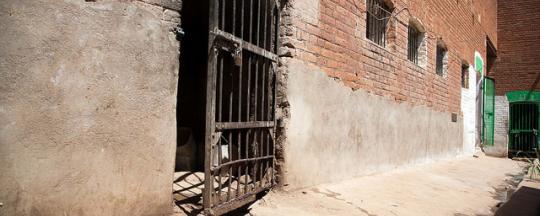HRW: US condemnation of Sudan atrocity crimes needs ‘robust follow-up action’

Prison cell in Darfur (File photo: Albert González Farran / UNAMID)
In response to the statement of US Secretary of State Antony Blinken last week, about atrocity crimes that have taken place during the more than the eight months of war in Sudan, Human Rights Watch (HRW) says that the condemnation of these crimes “should be followed up by robust action to halt abuses and ensure accountability”.
On December 6, Blinken condemned the Sudan Armed Forces (SAF) and the Rapid Support Forces (RSF) for unleashing “horrific violence, death, and destruction across Sudan” since the outbreak of fighting on April 15, and accused both sides of committing war crimes and crimes against humanity – which was vehemently denied by each of the warring parties.
Secretary Blinken accused both the Sudanese army SAF and the paramilitary RSF of war crimes. The USA also holds the “RSF and allied militias” responsible for crimes against humanity and ethnic cleansing.
“The US determination of the atrocity crimes unfolding in Sudan sends an important message to the victims that their suffering is known,” said Nicole Widdersheim, deputy Washington director at HRW.
“But for it to serve as a deterrent to further abuses and help safeguard civilians, it needs to be accompanied by a change of US government policy and concrete measures,” she said as reported by the international human rights watchdog in a statement yesterday.
Since the beginning of the war, at least 12,190 people have been killed and 6.6 million people have been displaced. In West Darfur, the RSF and its allied militias have targeted non-Arab civilians, notably Masalit community members, in ethnically motivated killings and carried out widespread pillage, arson, and sexual violence, HRW states.
Policy shift required
“Despite the gravity of the situation on the ground and the US government’s announcement that it has identified serious violations of international humanitarian law in Sudan, Secretary Blinken did not announce any action.
“The US should start by initiating robust consultations to explore the viability of alternatives for protecting civilians alongside the United Nations, African Union, and Intergovernmental Authority on Development (IGAD), which have not been able to provide adequate protection. The US should also impose additional sanctions on individuals against whom there is credible and sufficient evidence that they are responsible for serious crimes,” HRW says.
“The US government should also ensure that key civilian voices, including of displaced communities, human rights and women’s rights defenders, and other pro-democracy forces are represented in ongoing or upcoming discussions. It should increase funding for Sudanese rights and civil society organizations and designate refugees from Darfur, or subsets of refugees from Darfur such as victims of atrocity crimes and human rights defenders, as a ‘group of special concern’.
“Previous US government determinations that atrocities were being committed in Iraq, Burma, and China have been accompanied by some shifts in US policy, new allocations of resources, and increased efforts to support justice mechanisms. The Biden administration at a minimum should be considering new policies and program decisions concerning Sudan,” the human rights organisation proposes.
Investigations and protection needed
“Following the Sudan atrocity determination, the US government should express strong backing for the ICC Office of the Prosecutor’s investigation of recent crimes committed in Darfur, which ICC Prosecutor Karim Khan announced in July, and engage with Khan on how the US can best support the ICC’s effective prosecution of those implicated in the most serious recent crimes committed.
“The US should also convey strong support for the UN Fact-Finding Mechanism (FFM) on Sudan that would lead to independent evidence collection and preservation to foster justice and accountability for serious international crimes committed across Sudan, mindful that the ICC’s jurisdiction is currently limited to Darfur.
“The US government knows the magnitude of what is unfolding before its eyes, and should not choose to look away,” Widdersheim said. “It can start by rallying support for accountability efforts, including by the International Criminal Court, and working to fill the existing vacuum in civilian protection in Darfur.”











 and then
and then